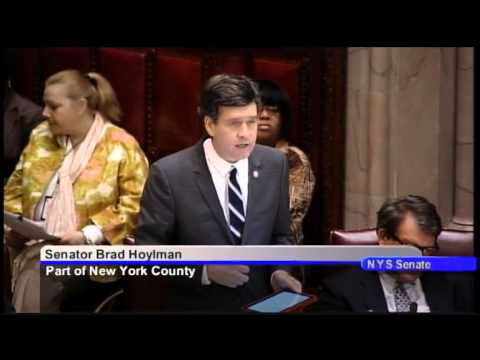
My Testimony Before the Mayor’s Office of Special Enforcement Supporting a Proposed Rule to Implement Local Law 146
December 18, 2018
My name is Brad Hoylman and I am the State Senator representing New York’s 27th Senate District, which includes neighborhoods with the highest number of illegal hotels in New York City such as Clinton/Hell’s Kitchen, Chelsea, the Village and the Lower East Side. Thank you for the opportunity to submit testimony to the Mayor’s Office of Special Enforcement regarding the proposed rule to implement Local Law 146 which imposes reporting requirements on operators of illegal hotels like Airbnb and HomeAway, also known as “short-term rentals.”
Since I have been in office, I have received numerous complaints from constituents regarding the devastating impact of illegal hotels on our community. Illegal hotels weaken affordable housing, pose public safety risks and impair our quality of life. As such, I fully support the Office of Special Enforcement’s proposed rule to implement Local Law 146 and urge its thorough enforcement.
Illegal hotels drive up the cost of living for residents already in the midst of a worsening affordable housing crisis. According to NYC Comptroller Scott Stringer, average monthly rents in neighborhoods with a high number of Airbnb listings rose at substantially higher rates than the borough average between 2009 and 2016. In Murray Hill, Gramercy and Stuyvesant Town, 21.5% ($105) of the monthly rent increase of $488 can be attributed to Airbnb. In Chelsea, Clinton and Midtown Business District, 21.6% ($86) of the monthly rent increase of $398 can be attributed to Airbnb. And in Battery Park City, Greenwich Village and Soho, 19.3% ($79) of the monthly rent increase of $411 can be attributed to Airbnb. Overall, NYC renters paid $616 million in additional rent in 2016 alone due to Airbnb. Landlords are already encouraged to evict their tenants due to weakened rent stabilization laws that incentivize displacement in order to transform affordable housing into market-rate units. The opportunity to convert a unit into an illegal hotel provides yet another financial incentive for landlords to evict rent stabilized or rent controlled tenants.
In addition to threatening affordable housing stock, illegal hotels present serious safety concerns. Illegal hotel operators often distribute keys to the front doors of residential buildings, allowing anyone to enter. This creates opportunities for vandalism or more serious crimes.
Furthermore, illegal hotels frequently violate fire safety regulations. In New York City, the Fire Code requires that legal transient occupancies comply with a higher level of fire protections than residential apartment buildings, a result of lessons learned in tragic hotel fires throughout the country. Since residential apartment buildings are not constructed with the same increased fire safety standards that the New York City Fire Code requires of hotels, transient occupants who presumably lack the same familiarity with the building’s layout as full-time residents are exposed to greater risk of injury or death in the event of a fire. Furthermore, illegal hotels frequently lack required fire-related safeguards. According to Reuters, fire extinguishers are only present in 29% of Airbnb rentals in New York City. Carbon monoxide detectors are only present in 58% of Airbnb rooms and homes counted in a national survey of Airbnb rentals.
By violating the law, services like Airbnb and HomeAway, also diminish our quality of life. A 2014 report by the New York Attorney General’s office found that 72% of Airbnb reservations made from 2010 to 2014 violated New York law and in 2015 alone, the Office of Special Enforcement received 1,150 complaints through 311 concerning illegal hotels. One constituent of mine reported living in a building that became overrun with Airbnb guests streaming in and out of the building, frequently leaving the front door wide open and thereby making her continually anxious about her safety. When illegal hotel operators break local zoning laws that separate commercial and residential use, they thereby undermine residents’ ability to determine what kind of community they want. New Yorkers have a right to the quiet enjoyment of their homes and visitors have a right to a safe, legal place to stay.
I hope the proposed rule is fully implemented so that our City can properly uphold the rule of law, promote a high standard of safety and quality of life for our communities and protect what remains of our City’s stock of affordable housing. As such, I applaud the Mayor’s Office of Special Enforcement for proposing this rule and I wholeheartedly urge its thorough enforcement.
Share this Article or Press Release
Newsroom
Go to NewsroomSpeaking Out Against 16th Street Overdevelopment
April 7, 2014
Public Forum on Child-Parent Security Act
April 2, 2014
Remarks on the Dismantling of the Moreland Commission
April 1, 2014
